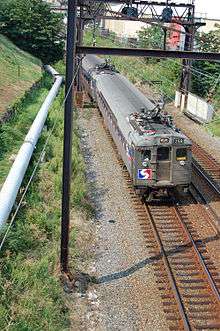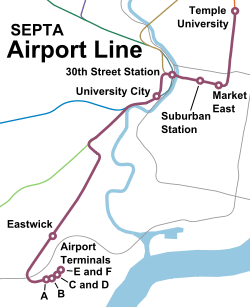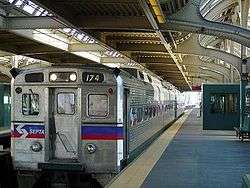Airport Line (SEPTA)
| Airport Line | |||
|---|---|---|---|
 An Airport Line train after departing 30th Street Station | |||
| Overview | |||
| Type | Commuter rail line | ||
| System | SEPTA | ||
| Status | Operating | ||
| Termini |
Philadelphia International Airport Terminals Temple University | ||
| Stations | 10 | ||
| Daily ridership | 6,835[1] | ||
| Website | septa.org | ||
| Operation | |||
| Opened | 1985 | ||
| Operator(s) | SEPTA Regional Rail | ||
| Technical | |||
| Track gauge | 4 ft 8 1⁄2 in (1,435 mm) standard gauge | ||
| Electrification | Catenary | ||
| |||
The Airport Line (formerly the R1 Airport) is a route of the SEPTA Regional Rail commuter rail system, which officially runs between Philadelphia International Airport and Philadelphia Center City. In practice however, only a few trains originate or terminate in Center City while most are through routed with lines to the north such as the Warminster Line or the West Trenton Line. In a planned reversal of this practice, sometime in late November 2015, SEPTA posted on its website that, beginning Dec. 14th, more trains would originate/ terminate at Jenkintown station during the weekdays. The line between Center City and the Airport Terminals runs seven days a week from 5:00 AM to midnight with trains every 30 minutes. The trip length from Suburban Station to the airport is 19 to 24 minutes.
Route

While geographically on the former Pennsylvania Railroad side of the Regional Rail System, the route consists of new construction, a reconstructed industrial branch of the former Pennsylvania Railroad, and a shared Conrail (formerly Reading Company) freight branch. The Airport Line opened on April 28, 1985 as SEPTA R1, providing service from Center City to the Philadelphia International Airport. By its twentieth anniversary in 2005, the line had carried over 20 million passengers to and from the airport. The line splits from Amtrak's Northeast Corridor north of Darby and passes over it via a flying junction. West of the airport, the line breaks from the old right-of-way and a new bridge carries it over I-95 and into the airport terminals between the baggage claim (arrivals) and the check-in counters (departures). The line ends between terminals E and F at their combined station.
Each airport station is directly connected to each airport terminal by escalators and elevators which rise one level to the walkways between the arrival and departure areas. All airport stations feature high-level platforms to make it easier to board and alight from the train with luggage, and some stations can be accessed directly from the baggage claim side across the road with the taxi stands.
Stations
The Airport Line makes the following station stops, after leaving the Center City Commuter Connection: All stations are in the City and County of Philadelphia.
| Zone | Milepost | Station | Boardings[2] | Notes |
|---|---|---|---|---|
| C | 1.7 | University City | 3,091 | (also Wilmington/Newark Line and Media/Elwyn Line) |
| 1 | 7.2 | Eastwick | 367 | |
| 4 | 9.1 | Airport Terminal A | 686 | |
| 4 | Airport Terminal B | 561 | ||
| 4 | 9.3 | Airport Terminal C & D | 756 | |
| 4 | 9.4 | Airport Terminal E & F | 450 |
History
The line south of the Northeast Corridor was originally part of the Philadelphia, Wilmington and Baltimore Railroad main line, opened on January 17, 1838. The connection between the NEC and the original PW&B is made however by the later 60th Street Branch. A new alignment of the PW&B (now the NEC) opened November 18, 1872, and on July 1, 1873 the Philadelphia and Reading Railway, later the Reading Company, leased the old line for 999 years. Connection was made over the PRR's Junction Railroad and later the Baltimore and Ohio Railroad's Baltimore and Philadelphia Railroad. However, as a condition of the sale, no passenger service was provided. The line passed into Conrail in 1976 and SEPTA in 1983, with passenger service to the Airport beginning on April 28, 1985.[3]
Infill stations were planned from the beginning of service, two of which were on the Airport Line proper: one at 70th Street, the other one at 84th Street. The latter station was opened in 1997 as Eastwick, while 70th Street was never built, and has since disappeared from maps. Additionally, University City station (proposed as "Civic Center") opened in April 1995 to serve all R1, R2 and R3 trains passing it. All these stations appeared on 1984 SEPTA informational maps, the first ones to show the Center City Commuter Connection and the Airport Line.
Ridership
Ridership by fiscal year:
| Fiscal year | Average weekday | Annual passengers |
|---|---|---|
| FY 2013 | 6,550 | 2,247,817[4] |
| FY 2012 | 6,167 | 2,116,435[5] |
| FY 2011 | 5,560 | 1,908,070[6] |
| FY 2010 | 6,907 | 2,282,273[7] |
| FY 2009 | 6,430 | 2,126,415[8] |
| FY 2008 | 6,073 | 2,003,900[9] |
| FY 2005 | 4,017 | 1,270,082 |
| FY 2004 | 3,942 | 1,106,581 |
| FY 2003 | 3,531 | 1,262,600 |
| FY 2001 | n/a | 1,276,000 |
| FY 2000 | n/a | 1,258,000 |
| FY 1999 | n/a | 1,068,000 |
| FY 1997 | n/a | 1,077,737 |
| FY 1996 | n/a | 1,017,262 |
| FY 1995 | 2,617 | 831,043 |
| FY 1994 | 2,240 | 742,824 |
| FY 1993 | 1,678 | 632,471 |
| Note: n/a = not available | ||
Rolling Stock
Airport Line former used Silverliner III cars, but now are using Silverliner IV cars.
References
- ↑ "Proposed Fiscal Year 2016 Annual Service Plan. p. 98" (PDF). SEPTA. April 2015.
- ↑ "Fiscal Year 2015 Annual Service Plan" (PDF). SEPTA. May 2014.
- ↑ "SEPTA - Airport Line - Celebrating 25 Years".
- ↑ "SEPTA (May 2014). Fiscal Year 2015 Annual Service Plan. p. 60" (PDF). (539 KiB)
- ↑ "SEPTA (May 2013). Fiscal Year 2014 Annual Service Plan. p. 44" (PDF).
- ↑ "SEPTA (May 2012). Fiscal Year 2013 Annual Service Plan. p. 55" (PDF). (539 KiB)
- ↑ "Archived copy" (PDF). Archived from the original (PDF) on 2011-08-23. Retrieved 2011-08-23.
- ↑ http://www.septa.org/reports/pdf/asp11.pdf
- ↑ http://www.septa.org/reports/pdf/asp10.pdf
- Railroad History Database
- PRR Chronology (Christopher T. Baer)
External links
| Wikimedia Commons has media related to Airport Line (SEPTA). |




